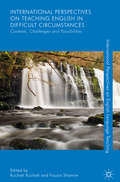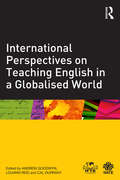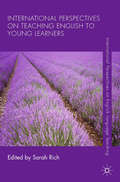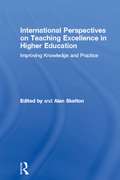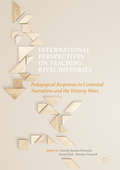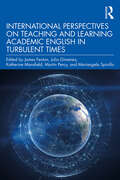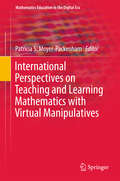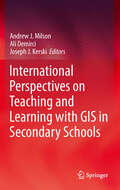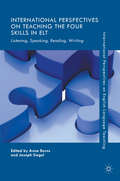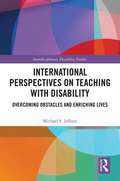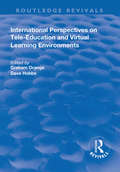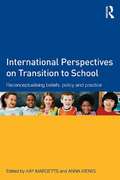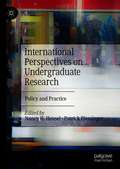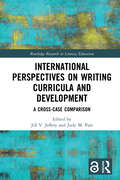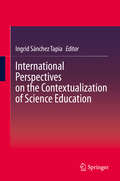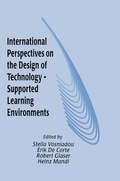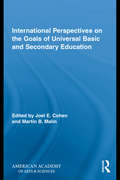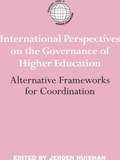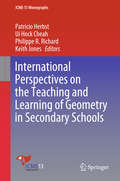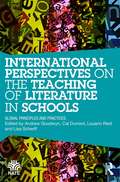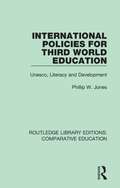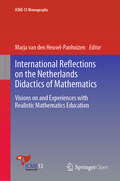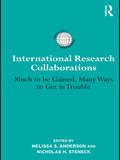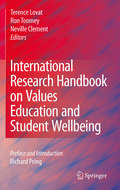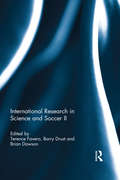- Table View
- List View
International Perspectives on Teaching English in Difficult Circumstances: Contexts, Challenges and Possibilities (International Perspectives on English Language Teaching)
by Kuchah Kuchah Fauzia ShamimThis book offers a holistic practitioner and research-based perspective on English Language Teaching and teacher education in difficult circumstances. In addition to extending the current conceptualization of ‘difficult circumstances’ in ELT to include the broader policy issues that may affect ELT in low-to-mid income countries, the book focuses on the challenges faced by practitioners and learners in contexts of confinement, conflict and special education. The chapters in this collection examine the challenges and problems that emerge from the complex current ELT environment, and present examples of contextualized inquiry-based strategies and interventions to address these challenges. Underlining the need to extend the boundaries of the discipline of ELT to include teaching-learning in less privileged contexts, this wide-ranging volume will appeal to students, scholars and practitioners of English Language Teaching.
International Perspectives on Teaching English in a Globalised World (National Association for the Teaching of English (NATE))
by Louann Reid Andrew Goodwyn Cal DurrantThe renowned and highly experienced editors of this book bring together the leading voices in contemporary English education under the banner of the International Federation for the Teaching of English (IFTE). The collected chapters here represent the very best of international writing on the teaching of English in the past decade. The key issues and debates surrounding English teaching across the globe are discussed and analysed accessibly, and incorporate wide-ranging topics including: • The impact of high stakes testing on teaching and learning; • Addressing the needs of minority groups; • The digitization of literature and new conceptions of text;• Rewriting the canon; • Dealing with curriculum change;• "Best practices" in the teaching of English;• The tension between ‘literacy’ and ‘English’; • English and bilingual education;• The impact of digital technologies on teaching and learning;• Conceptions of English as a subject [secondary and tertiary];• Bringing the critical into the English/Literacy classroom;• The future of subject English;• Empowering voices on the margins; • Pre-service teacher education; • The social networking English classroom. This text looks at the changing face of subject English from the differing perspectives of policy makers, teacher educators, teachers and their students. It tackles some of the hard questions posed by technological advances in a global society, challenges conventional approaches to teaching and points to the emerging possibilities for a traditional school subject such as English in the face of rapid change and increasing societal expectations. Despite all of the converging political and technological threats, the authors of this engaging and insightful text portray an immense confidence in the ultimate worth of teaching and learning subject English.
International Perspectives on Teaching English to Young Learners
by Sarah RichThis volume comprises 11 research-led accounts from Teaching English to Young Learner (TEYL) educators working in a range of diverse settings worldwide. The innovative practical and theoretical perspectives offer some important insights into effective TEYL pedagogy for the 21st century.
International Perspectives on Teaching Excellence in Higher Education: Improving Knowledge and Practice
by Alan SkeltonThere has been an explosion of interest in teaching excellence in higher education. Once labelled the ‘poor relation’ of the research/teaching divide, teaching is now firmly on the policy agenda; pressure on institutions to improve the quality of teaching has never been greater and significant funding seeks to promote teaching excellence in higher education institutions. This book constitutes the first serious scrutiny of how and why it should be achieved. International perspectives from educational researchers, award winning teachers, practitioners and educational developers consider key topics, including: policy initiatives research-led teaching teaching excellence and scholarship the significance of academic disciplines research into teaching excellence rewarding through promotion inclusive learning and ICT. Teaching Excellence in Higher Education provides a guide for all those supporting, promoting and trying to achieve teaching excellence in higher education and sets the scene for teaching excellence as a field for serious investigation and critical enquiry.
International Perspectives on Teaching Rival Histories
by Anna Clark Henrik Åström Elmersjö Monika VinterekThis book presents a survey of approaches to dealing with 'rival histories' in the classroom, arguing that approaching this problem requires great sensitivity to differing national, educational and narrative contexts. Contested narratives and disputed histories have long been an important issue in history-teaching all over the world, and have even been described as the 'history' or 'culture' wars. In this book, authors from across the globe ponder the question "what can teachers do (and what are they doing) to address conflicting narratives of the same past?", and puts an epistemological issue at the heart of the discussion: what does it mean for the epistemology of history, if it is possible to teach more than one narrative? Divided into three sections that deal with historical cultures, multicultural societies and multiperspectivity, the chapters of the book showcase that dealing with rival histories is very much dependent on context, and that diverse teaching traditions and societal debates mean that teachers' abilities in engaging with the teaching of rival narratives are very different. The volume will be compelling reading for students and researchers in the fields of education, history, sociology and philosophy, as well as practising teachers.
International Perspectives on Teaching and Learning Academic English in Turbulent Times
by Katherine Mansfield James Fenton Julio Gimenez Mariangela Spinillo Martin PercyThis volume shares proven strategies for Academic English teaching, research, and development in challenging circumstances. Through original first-hand experiences from around the world, the collection reveals how educators in higher education have responded to the specific needs and challenges of teaching second language learners in turbulent times, as seen during the COVID-19 pandemic. Organised thematically, the book covers rapid responses to crises, adapting to teaching online, collaborations and online learning communities, and assessment practices. The volume provides original insights and practical suggestions for a range of practices across English for Academic and Specific Purposes that can address new and unfamiliar circumstances, both now and in future challenging times. The collection includes a wealth of effective strategies, varied research methodologies, and resources for practice making it an invaluable reference for practitioners, students, and researchers in the field of academic English, ESL/EFL, and online language instruction.
International Perspectives on Teaching and Learning Mathematics with Virtual Manipulatives
by Patricia S. Moyer-PackenhamThis book explores terminology, frameworks, and research being conducted worldwide on virtual manipulatives. It brings together international authors who provide their perspectives on virtual manipulatives in research and teaching. By defining terminology, explaining conceptual and theoretical frameworks, and reporting research, the authors provide a comprehensive foundation on the study and use of virtual manipulatives for mathematics teaching and learning. This foundation provides a common way for researchers to communicate about virtual manipulatives and build on the major works that have been conducted on this topic. By discussing these big ideas, the book advances knowledge for future research on virtual manipulatives as these dynamic tools move from computer platforms to hand-held, touch-screen, and augmented platforms.
International Perspectives on Teaching and Learning with GIS in Secondary Schools
by Joseph J. Kerski Andrew J. Milson Ali DemirciThis, the first publication to collate a broad international perspective on the pedagogical value of GIS technology in classrooms, offers an unprecedented range of expert views on the subject. Geographic Information Systems (GISs) are now ubiquitous and relatively inexpensive. They have revolutionized the way people explore and understand the world around them. The capability they confer allows us to capture, manage, analyze, and display geographic data in ways that were undreamt of a generation ago. GIS has enabled users to make decisions and solve problems as diverse as designing bus routes, locating new businesses, responding to emergencies, and researching climate change. GIS is also having a major impact in the classroom. Students and teachers around the world are using this significant emerging technology in the secondary school classroom to study social and scientific concepts and processes, to broaden their technical skills, and to engage in problem solving and decision making about local and global issues. International Perspectives on Teaching and Learning with GIS in Secondary Schools brings together authors from 34 countries who profile the current status of GIS in secondary school teaching and learning in their country. Each chapter includes a summary of the country's educational context, a case study illustrating how GIS is used in secondary schooling, and an assessment of the opportunities and challenges in teaching and learning with GIS now and in the future. The book demonstrates that GIS is not only a technological tool to be used in the classroom, but also a catalyst for motivation, encouragement, and cooperation in understanding and solving global problems. The most up to date and extensive survey of GIS in the secondary education landscape, covering both principles and practice. Professor David Maguire, Pro-Vice-Chancellor, Birmingham City University, UK International Perspectives on Teaching and Learning With GIS in Secondary Schools is a highly relevant, critically important, reflective contribution to the literature, providing strong arguments supporting the inclusion for spatial studies for all in secondary school education. Karl Donert, President, EUROGEO This is an invaluable and inspirational examination of innovation in geospatial technologies in secondary schools around the world. Each chapter contains practical models for how to integrate powerful tools for spatial analysis into a range of subjects. It will be useful to classroom teachers and administrators seeking pathways to implementation and teacher educators considering how to prepare the next generation to use geospatial technologies. Sarah Witham Bednarz, Department of Geography, Texas A&M University, College Station, TX, USA
International Perspectives on Teaching the Four Skills in ELT
by Anne Burns Joseph SiegelThis book offers a range of perspectives and insights from around the world on the teaching and learning of listening, speaking, reading and writing. It brings together contributors from across six continents, who analyse a wide range of teaching and learning contexts, including primary, secondary, tertiary, private, and adult ESL/EFL classes. In doing so, they provide locally relevant accounts that nonetheless resonate with other contexts and wider concerns. This informative and practical edited collection will appeal to students and scholars who are interested in the four building blocks of language learning, as well as language education and teacher education.
International Perspectives on Teaching with Disability: Overcoming Obstacles and Enriching Lives (Interdisciplinary Disability Studies)
by Michael S. JeffressEfforts to reduce discrimination and increase diversity on campuses, coupled with shrinking budgets causing administrators to devote more resources toward recruiting and retaining students with disabilities, are fuelling an explosion of research in the area of inclusive education. An important focus that has been largely neglected is the place of teachers with disabilities in academe. International Perspectives on Teaching with Disability brings together 25 multi-disciplinary scholars with disabilities from Africa, Canada, the Caribbean, the UK, Israel and the United States to share their struggles and successes in teaching with disability. The 18 chapters are written largely from autoethnographic perspectives grounded in solid academic research but full of anecdotes and self-reflexive narratives that provide insights into the lived experiences of the authors. Woven into the narratives are discussions of the complexities of self-disclosure and self-advocacy; the varied—and often problematic—ways disability is experienced, perceived and discussed in society and in the classroom; the challenges of navigating academe with disability, the value of disability pedagogy, the positive student outcomes achieved by teaching through disability, as well as practical applications and lessons learned that will benefit educators, administrators and students preparing to become teachers. This book is written to champion the integral place and role of disabled educators in academe. Current educators with disability will be affirmed. Those with disability aspiring to become teachers will be encouraged. Temporarily able-bodied administrators and educators will be challenged. Everyone will be informed. This book will be a welcome addition to reading lists in a wide array of academic fields including: Education, Pedagogy, Disability Studies, Human Resources Management, and Sociology.
International Perspectives on Tele-Education and Virtual Learning Environments (Routledge Revivals)
by Graham Orange Dave HobbsThis title was first published in 2000: Teaching, learning and assessment methods are constantly evolving, providing the educator with a range of issues and new challenges. This book addresses these challenges through the use of information and communications technologies and presents a vision of how these may be deployed in the educational environments of the future.
International Perspectives on Transition to School: Reconceptualising beliefs, policy and practice
by Kay Margetts Anna KienigWith increasing attention given by governments and policy makers to children’s transition to school, and the associated need for educators, families and communities to be supported in the process, changes are often required to existing structures and pedagogy. This book is framed around the notion of transition as a time of change for those involved in the transition process and as a time for reconceptualising beliefs, policy and practice. It explores transition from a number of international perspectives and raises issues around the coherence of: how children perceive and respond to starting school; the roles and expectations of parents; developmental changes for parents; supporting children with diverse learning needs; how policy, curriculum and pedagogy are conceived and implemented. Readers will be informed about current practices and issues arising out of research in Europe, Scandinavia, the United Kingdom and Australia and will be stimulated to consider how they can change their own transition beliefs, policies and practices. Transition to school: Contemporary Perspectives and Change is essential reading for researchers and educators and anyone wanting to know more about the transition to school and how to support young children, their families and schools.
International Perspectives on Undergraduate Research: Policy and Practice
by Nancy H. Hensel Patrick BlessingerThis edited volume explores how undergraduate research and research-based teaching is being implemented in countries around the world. Leading educators come together to discuss commonly accepted definitions of undergraduate research, country-specific models and partnerships for student research, university policies and practices to support faculty and staff who engage students in research, and available assessment data that supports the effectiveness of undergraduate research as a means to increase student engagement and academic achievement. As undergraduate research has spread around the world, professors, administrators, and policymakers benefit by learning about other approaches and models of undergraduate research.
International Perspectives on Writing Curricula and Development: A Cross-Case Comparison (Routledge Research in Literacy Education)
by Jill V. Jeffery Judy M. ParrThis book contributes to the innovation of writing education and research globally by providing crucial insights into how the structures and aims of literacy curricula vary internationally. It examines how nine education systems across five continents represent ‘good writing’ in curricula that shape students’ experiences learning to write in school. The book presents curricular analyses aimed at providing insight into how writing development can be better supported through innovative policy and research. The findings regarding international variation are presented under three broad dimensions: social and contextual factors that shape writing curricula; the discourses of writing reflected in curricula and official documents; and hallmarks of classroom practice, including the relationship with official discourse. Case study chapters present integrated inductive and deductive document analyses, findings of which are compared in a concluding, cross-case analysis chapter. Offering a detailed comparative analysis of writing research, International Perspectives on Writing Curricula and Development will be of great interest to academics, researchers and students in the fields of education, literacy and curriculum studies. It will also be relevant reading for policymakers and curriculum designers.
International Perspectives on the Contextualization of Science Education
by Ingrid Sánchez TapiaThis book explores how science learning can be more relevant and interesting for students and teachers by using a contextualized approach to science education. The contributors explore the contextualization of science education from multiple angles, such as teacher education, curriculum design, assessment and educational policy, and from multiple national perspectives. The aim of this exploration is to provide and inspire new practical approaches to bring science education closer to the lives of students to accelerate progress towards global scientific literacy. The book presents real life examples of how to make science relevant for children and adolescents of diverse ethnic and language backgrounds, socioeconomic status and nationalities, providing tools and guidance for teacher educators and researchers to improve the contextualization and cultural relevance of their practice. The book includes rigorous studies demonstrating that the contextualization of science learning environments is essential for student engagement in learning science and practitioners' reflections on how to apply this knowledge in the classroom and at national scale. This approach makes this book valuable for researchers and professors of science education and international education interested in designing teacher education courses that prepare future teachers to contextualize their teaching and in adding a critical dimension to their research agendas.
International Perspectives on the Design of Technology-supported Learning Environments
by Robert Glaser Stella Vosniadou Erik De Corte Heinz MandlIn recent years, the use of technology for the purposes of improving and enriching traditional instructional practices has received a great deal of attention. However, few works have explicitly examined cognitive, psychological, and educational principles on which technology-supported learning environments are based. This volume attempts to cover the need for a thorough theoretical analysis and discussion of the principles of system design that underlie the construction of technology-enhanced learning environments. It presents examples of technology-supported learning environments that cover a broad range of content domains, from the physical sciences and mathematics to the teaching of language and literacy. The emphasis in this book is not on the design of educational software but on the design of learning environments. A great deal of research on learning and instruction has recently moved out of the laboratory into the design of applications in instructional settings. By designing technology-supported learning environments instructional scientists attempt to better understand the theories and principles that are explicit in their theories of learning. The contributors to this volume examine how factors such as social interaction, the creation of meaningful activities, the use of multiple perspectives, and the construction of concrete representations influence the acquisition of new information and transfer.
International Perspectives on the Goals of Universal Basic and Secondary Education (Routledge Research in Education)
by Joel E. Cohen Martin B. MalinAlthough universal schooling has been adopted as a goal by international organizations, bilateral aid agencies, national governments, and non-profit organizations, little sustained international attention has been devoted to the purposes or goals of universal education. What is universal primary and secondary education intended to accomplish? This book, which grew out of a project of the American Academy of Arts & Sciences, offers views from Asia, Africa, Europe, North America and South America on the purposes of universal education while considering diverse cultures, religions, and professions. It is the first book in which renowned authors from around the world have proposed, considered, and debated goals of basic and secondary education, engaging in a constructive dialogue on one of the most pressing issues facing education today.
International Perspectives on the Governance of Higher Education: Alternative Frameworks for Coordination (International Studies in Higher Education)
by Jeroen HuismanEssential reading for policy makers, institutional leaders, managers, advisors, and scholars in the field of higher education, International Perspectives on the Governance of Higher Education analyzes how the governance of higher education systems has evolved in recent years. This volume is an authoritative overview with contributions from authors from the U.K., the Netherlands, Denmark, Portugal, Norway, Italy, Ireland, Austria, Germany, Canada, the U.S. and Australia. Comprehensive in coverage, this volume explores how the use of disciplinary approaches and frameworks, particularly from political science, public administration and public policy help us to understand better the coordination of higher education systems. This is an arduous but gratifying challenge, given the current complexity of multi-actor and multi-level steering in higher education, rife with unintended outcomes and unanticipated dynamics. The edited volume looks to: The role of government, market and network steering in higher education systems. Governance in the knowledge society. How the use of disciplinary approaches help to better understand the steering policy processes and outcomes in higher education. Empirical studies exploring governance issues across systems and over time within systems.
International Perspectives on the Teaching and Learning of Geometry in Secondary Schools (ICME-13 Monographs)
by Keith Jones Patricio Herbst Ui Hock Cheah Philippe R. RichardThis book presents current perspectives on theoretical and empirical issues related to the teaching and learning of geometry at secondary schools. It contains chapters contributing to three main areas. A first set of chapters examines mathematical, epistemological, and curricular perspectives. A second set of chapters presents studies on geometry instruction and teacher knowledge, and a third set of chapters offers studies on geometry thinking and learning. Specific research topics addressed also include teaching practice, learning trajectories, learning difficulties, technological resources, instructional design, assessments, textbook analyses, and teacher education in geometry. Geometry remains an essential and critical topic in school mathematics. As they learn geometry, students develop essential mathematical thinking and visualization skills and learn a language that helps them relate to and interact with the physical world. Geometry has traditionally been included as a subject of study in secondary mathematics curricula, but it has also featured as a resource in out-of-school problem solving, and has been connected to various human activities such as sports, games, and artwork. Furthermore, geometry often plays a role in teacher preparation, undergraduate mathematics, and at the workplace. New technologies, including dynamic geometry software, computer-assisted design software, and geometric positioning systems, have provided more resources for teachers to design environments and tasks in which students can learn and use geometry. In this context, research on the teaching and learning of geometry will continue to be a key element on the research agendas of mathematics educators, as researchers continue to look for ways to enhance student learning and to understand student thinking and teachers’ decision making.
International Perspectives on the Teaching of Literature in Schools: Global Principles and Practices (National Association for the Teaching of English (NATE))
by Louann Reid Andrew Goodwyn Cal Durrant Lisa ScherffLiterature teaching remains central to the teaching of English around the world. This edited text brings together expert global figures under the banner of the International Federation for the Teaching of English (IFTE). The book captures a state-of-the-art snapshot of leading trends in current literature teaching, as well as detailing predicted trends for the future. The expert scholar and leading teacher contributors, coming from a wide range of countries with fascinatingly diverse approaches to literature teaching, cover a range of central and fundamental topics: literature and diversity; digital literatures; pedagogy and reader response; mother tongues; the business of reading; publishers, adolescent fiction and censorship; assessing responses to literature; the changing definitions of literature and multimodal texts. The collection reviews the consistently important place of literature in the education of young people and provides international evidence of its enduring value and contribution to education, resisting the functionalist and narrowly nationalist perspectives of misguided government authorities. International Perspectives on the Teaching of Literature in Schools will be of value to researchers, PhD students, literature scholars, practitioners, teacher educators, teachers and all those in the extensive academic community interested in English and literacy around the world.
International Policies for Third World Education: Unesco, Literacy and Development (Routledge Library Editions: Comparative Education #8)
by Phillip W. JonesOriginally published in 1988. Bringing the world close to universal literacy will be a major legacy of the twentieth century. But the rapid and widespread developments in education that have enabled this to happen have not taken place in a social and political vacuum. In some instances conditions conducive to mass literacy have only come about through popular revolution or rapid economic development, but a less spectacular and frequently less tangible role has been played by a number of international agencies. The most prominent of these is Unesco, which has had the goal of global literacy at the heart of its endeavours ever since its foundation in 1946. Agreement on the best means of achieving this goal, however, has been very difficult to come by, and Unesco's literacy program has been shaped by internal and external politics as well as by local exigencies. This book outlines how Unesco's literacy program has evolved, and by discussing how idealistic aims and intentions have been given shape and direction by more immediate political and bureaucratic concerns provides a critique, in miniature, of the post-war history of the United Nations and related organisations.
International Reflections on the Netherlands Didactics of Mathematics: Visions on and Experiences with Realistic Mathematics Education (ICME-13 Monographs)
by Marja van den Heuvel-PanhuizenThis open access book, inspired by the ICME 13 Thematic Afternoon on “European Didactic Traditions”, takes readers on a journey with mathematics education researchers, developers and educators in eighteen countries, who reflect on their experiences with Realistic Mathematics Education (RME), the domain-specific instruction theory for mathematics education developed in the Netherlands since the late 1960s. Authors from outside the Netherlands discuss what aspects of RME appeal to them, their criticisms of RME and their past and current RME-based projects. It is clear that a particular approach to mathematics education cannot simply be transplanted to another country. As such, in eighteen chapters the authors describe how they have adapted RME to their individual circumstances and view on mathematics education, and tell their personal stories about how RME has influenced their thinking on mathematics education.
International Research Collaborations: Much to be Gained, Many Ways to Get in Trouble (International Studies in Higher Education)
by Melissa S. AndersonEncouraged by their institutions and governments and aided by advances in technology and communication, researchers increasingly pursue international collaborations with high hopes for scientific breakthroughs, intellectual stimulation, access to research equipment and populations, and the satisfaction of global engagement. International Research Collaborations considers what can and does go wrong in cross-national research collaborations, and how scientists can avoid these problems in order to create and sustain productive, mutually-enriching partnerships. Unfamiliar approaches to training, legal and regulatory complications, and differences in funding and administration pose challenges for collaboration that are then compounded by the need to satisfy the requirements of different research systems. To help today’s international researchers create the best possible partnerships, chapters by funding officers, diplomats, attorneys, publishers, regulators, graduate students and postdocs, industry researchers, administrators, and scholars of responsible research address the following key trouble spots: how research is organized and funded the legal and normative environments of research differences in regulation and oversight variation in graduate education and postdoctoral training. International Research Collaborations will provide valuable insights to researchers who are collaborating or who intend to collaborate, as well as to administrators, funders, regulators, editors, and policy-makers involved in cross-national research.
International Research Handbook on Values Education and Student Wellbeing
by Terence Lovat Neville Clement Ron ToomeyInformed by the most up-to-date research from around the world, as well as examples of good practice, this handbook analyzes values education in the context of a range of school-based measures associated with student wellbeing. These include social, emotional, moral and spiritual growth - elements that seem to be present where intellectual advancement and academic achievement are being maximized. This text comes as 'values education' widens in scope from being concerned with morality, ethics, civics and citizenship to a broader definition synonymous with a holistic approach to education in general. This expanded purview is frequently described as pedagogy relating to 'values' and 'wellbeing'. This contemporary understanding of values education, or values and wellbeing pedagogy, fits well with recent neuroscience research. This has shown that notions of cognition, or intellect, are far more intertwined with social and emotional growth than earlier educational paradigms have allowed for. In other words, the best laid plans about the technical aspects of pedagogy are bound to fail unless the growth of the whole person - social, emotional, moral, spiritual and intellectual, is the pedagogical target. Teachers and educationalists will find that this handbook provides evidence, culled from both research and practice, of the beneficial effects of such a 'values and wellbeing' pedagogy.
International Research in Science and Soccer II
by Brian Dawson Terence Favero Barry DrustInternational Research in Science and Soccer II showcases the very latest research into the world’s most widely played sport. With contributions from scientists, researchers and practitioners working at every level of the game, from grassroots to elite level, the book covers every key aspect of preparation and performance, including: • performance and match analysis; • training and testing; • physiotherapy and injury prevention; • biomechanics; • youth development; • women’s soccer; • sport science and coaching; • sport psychology. Sports scientists, trainers, coaches, physiotherapists, medical doctors, psychologists, educational officers and professionals working in soccer will find this in-depth, comprehensive volume an essential and up-to-date resource. The chapters contained within this volume were first presented at The Fourth World Conference on Science and Soccer, held in Portland, Oregon, in June 2014 under the auspices of the World Commission of Science and Sports.
